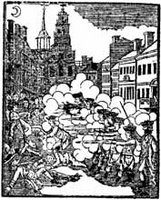James Brewer at the Boston Massacre, part 4
 Here’s the end of Josiah Quincy, Jr.’s cross-examination of prosecution witness James Brewer at the trial of eight British enlisted men for the Boston Massacre. The pump and blockmaker continued not to recall the crowd doing or saying anything threatening on King Street on the night of 5 Mar 1770. But Quincy was able to elicit some information from him that might help the defense:
Here’s the end of Josiah Quincy, Jr.’s cross-examination of prosecution witness James Brewer at the trial of eight British enlisted men for the Boston Massacre. The pump and blockmaker continued not to recall the crowd doing or saying anything threatening on King Street on the night of 5 Mar 1770. But Quincy was able to elicit some information from him that might help the defense:
Q: Did you hear any huzzas or cheers as they are called?There were indeed seven guns fired, a detail that became crucial in the final arguments. The jury could not convict the eight soldiers as a group or they would be condemning one man who was clearly innocent. But which one? The prosecution had to either identify the one man who had not fired or to prove that certain others had.
B: I heard a clamour of the people, but I hear no cheers.
Q: Did you hear them call the soldiers any names?
B: No.
Q: Did you hear any body say, kill them, damn them knock them over?
B: No.
Q: Did you hear the whistling about the streets at the time?
B: No.
Q: Did you see any person strike with a club at the soldiers or any of them?
B: No.
Q: Did you see them attempt to strike their guns?
B: No.
Q: Did you hear the rattling of the guns as though a stick had struck upon them?
B: No. I heard people around call fire.
Q: Did you take that to be the cry of fire, or bidding the soldiers fire?
B: I cannot tell now what I thought then.
Q: How many guns did you hear fired?
B: I think seven.
Q: Did the word fire proceed from the people or from the soldiers?Brewer had mentioned Dr. Young earlier, but not his sword. He may have volunteered that detail in an attempt to contrast the atmosphere of danger around the soldiers’ barracks with the calm he was describing outside the Customs house. But the defense lawyer seized on that detail. Young was well known as a radical thinker—an actual democrat. Had he encouraged the crowd to be violent, or directed men to King Street? Brewer went back to not remembering.
B: From the people.
Q: Was there a greater noise than usual, when the bells rang for fire?
B: I did not think there was so much. When I saw Dr. [Thomas] Young, he had a sword in his hand. When I came in King-street it was as quiet as I ever saw it in my life.
Q: Was the sword naked or not?Such statements like this might hint that the Boston crowd saw Brewer as a leader among them, or at least an example to follow.
B: I cannot remember.
Q: What sort of sword was it?
B: I do not remember.
Q: What did Young say to you?
B: He said it was best for every body to go home.
Q: Did any body huzza for King street?
B: No. I said, every man home, and the word went round.
Q: Did not Dr. Young say the soldiers were beat to their barracks?I think the phrase “beat to their barracks” probably refers to a drum signal, what Thomas Simes’s Military Medley (1768) called a “taptoo.”
B: No; He said they had made a rumpus, and were gone to their barracks.
Q: Do you know if Dr. Young went into King-street?
B: I cannot tell, I left him in the lane.
COMING UP: A missing detail from Brewer’s testimony.

No comments:
Post a Comment